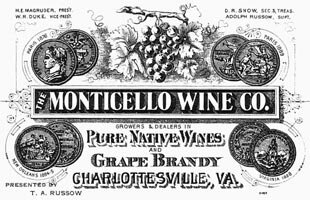>> Back to The HooK front page
NEWS- Wine roots: Lost history gets marker
Published April 14, 2005, in issue 0415 of the Hook
BY LISA PROVENCE
There's a gap in Charlottesville's wine history. Between Thomas Jefferson's efforts to establish vineyards and the spate of wineries sprouting over the past couple of decades, winemaking thrived in the intervening 200 years-- until Prohibition crushed its spirits in 1916.
A historic marker downtown near the Recycling Center commemorating the Monticello Wine Company, the second largest in Virginia, will soon correct that historical oversight.
"It was one of the largest commercial wineries," says Jeff Werner, whose house at 212 Wine Street was the home of the winery's general manager, Adolph Russow.
Founded in 1873, Monticello Wine Company "took winemaking out of the cellar in Central Virginia and to the corporate level," says Werner, who set the wheels in motion for the historical marker after meeting Russow's grandson, Ed Hase.
The winery used grapes from local vineyards, and Charlottesville proclaimed itself the "Capital of the Wine Belt in Virginia." A bottle of Monticello Wine christened the USS Virginia in 1904, according to the marker's text.
The four-story brick building with cellar sat across from what's now the Greek Orthodox Church on Perry Drive, until the building burned in 1937. A railroad track behind the recycling center on McIntire provided convenient transportation for shipping wine.
"Vineyards were all over Albemarle County," says Werner. "It's interesting how much viticulture was a part of our past. The current boom is not a new thing. It's just coming back."
Wine history has made strange bedfellows. Werner, who works for the Piedmont Environmental Council, is often on different sides of public policy issues from Neil Williamson at the pro-biz Free Enterprise Forum.
But Williamson also does marketing for local wineries, and one of his clients, Stone Mountain Vineyards in Greene County, is going to foot the approximately $1,200 bill to have the historic marker cast.
"Charlottesville has a rich wine history," says Williamson. "And this is a little bit of lost history. A lot of people don't know why we have a Wine Street. No active wineries survived Prohibition."
Although the marker was approved the Department of Historic Resources on March 17, Williamson thinks it may be around harvest time before it's installed in the grassy triangle on Perry Drive. "I hear it takes about six months to get it forged," he says.
And once installed, it's not beyond the realm of possibility that Werner and Williamson will be clinking glasses over one issue they agree upon: history refound.

A "calling card" proclaims that even back in the late 1800s, Charlottesville had an award-winning winery.
PHOTO COURTESY ED HASE
#
>> Back to The HooK front page
|